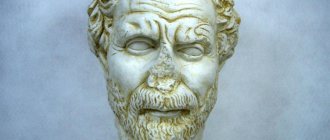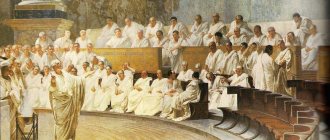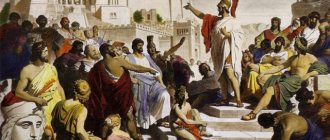The article presents a brief history of rhetoric, as well as the reason for the emergence and spread of rhetoric throughout the world.
Why are some public speeches heard and immediately forgotten, while the phrases of other speakers become catchphrases and remain forever in the culture and history of the nation, for example, as in the USA:
“Ask not what your country can do for you, ask what you can do for your country.”
John Kennedy
Or in the USSR:
"Who does not work shall not eat".
V. I. Lenin
History of origin
Rhetoric arose in the 5th century BC. Empedoclonus, according to Aristotle, is considered the inventor of a new form of art. And the first work in rhetoric is a treatise by Empedoclonus’ student, Corax.
Unfortunately, the treatise has not survived to this day; its contents became known from the works of ancient writers. Corax was a trial lawyer and was a favorite of the Syracusan tyrant Heron.
He was the first to formulate a definition of rhetoric: “Eloquence is the worker of persuasion.” He did not stop there and defined the composition of oratory, which is still used today, dividing it into main parts:
- Introduction.
- Offer.
- Presentation.
- The proof is in the struggle.
- Conclusion.
Corax expressed the opinion (and adhered to it) that the goal of the speaker is not to reveal the truth, but to clearly and convincingly speak with the help of sophisms (deliberately false conclusions).
Isei
One of the ten most famous ancient Greek speakers is Iseus from Chalkis, who spent almost his entire life improving the art of eloquence. This person is also the author of several fateful speeches that were written specifically to order for legal proceedings. Today, feature films are made based on these very speeches, and actors build their fame on them.
Iseus was the mentor of Demosthenes, and he himself studied with the famous orator Isocrates. Today you can find 11 court speeches, which are extremely popular because they present everything in a very accessible language. Isei is considered much wiser than his mentor, but whether this is actually so is not for us to judge. Be that as it may, his speeches became a source of inspiration for many people who have now gained popularity.
Founders
The next founder of rhetoric is considered to be Corax’s student, Lysias. He continued to develop, like his teacher, a system of sophistic proofs.
He especially praised the “crocodile” (logical paradox) of his teacher. He also had students. Part of the teaching methodology was to memorize passages from famous speeches of famous public people.
One of his students was Gorgias of Leontius. He went further than his teacher. He was able to convincingly turn the truth around in his speeches. For example:
- pass off the old as new, and the new as old;
- express completely contradictory views about the same thing.
Gorgias was sure that the most important thing is not the truth, but the probable. He had students and followers. His teaching method did not differ from the method of Lysias, his teacher - memorizing passages from the works or speeches of the best speakers.
His legacy left an interesting work - the treatise “On a Decent Occasion.” In it, Gorgias teaches how serious arguments can be destroyed by mockery, and mockery can be answered with dignity.
From the school of Gorgus came world-famous orators: Paul, Agrigentius, Licymnius, Thrasymachus, Even, Theodore of Byzantium, Protagoras, Prodicus, Isocrates.
The next famous names for history in the field of rhetoric were: Aristotle, Cicero, Quintilian.
Who is a speaker?
Before we begin to familiarize ourselves with the main material, let's first understand who the speaker is and what he does. If you turn to the dictionary of the modern Russian language, you can find several definitions of this term, each of which carries a certain amount of truth. For example, speakers today are people who study the art of eloquence at a professional level.
Also, many modern writers use this term in their works, presenting to the reader characters who have a certain gift of speech. In short, a speaker is a person who delivers a specific speech. In the following sections you will find the names of ancient Greek speakers and their works, which are also used by the modern generation.
The importance of ancient rhetoric for world culture
Rhetoric originated and developed in Ancient Greece, then its teaching went beyond the country and spread to Ancient Rome, then to Western Europe, then to Eastern Europe, to the Slavs.
Let's say more, oratory has not lost its relevance today. Throughout the development of mankind, the works of ancient speakers have been and are being studied.
The talent of persuasion and the skill of oratory was and is in demand at all times and anywhere in the world on Earth.
- The works of the masters of ancient rhetoric were and are the subject of controversy and admiration.
- They became the foundation for the emergence of new sciences: philosophy, logic, linguistics, functional stylistics, speech culture.
- They are studied at universities in the faculties of philosophy, linguistics, psychology and jurisprudence;
- Rhetoric has become part of a quality liberal arts education.
- Eloquence courses are very popular, which help to acquire persuasion skills, increase the self-esteem of an individual, and cure “tongue-tiedness.”
Eloquence in the temple and in the scientific department
In the Middle Ages, a paradoxical situation arose: the ancient world and its achievements were declared by the church to be “sinful,” “pagan,” but at the same time, many of the achievements of ancient Greek and Roman thinkers were actively used by European theologians. Thus, clearly with an eye to the works of Aristotle and Cicero, many of the works of Thomas Aquinas, Augustine the Blessed and other “fathers of the church” were compiled. The need to “carry the word of God” and to expound church dogmas to the illiterate gave birth to talented preachers, who sometimes had greater influence on the flock than the ruling kings and emperors - the already mentioned Savonarola can be cited as an example. Rhetoric also played an important role during the years of conflicts between different religious movements.
John Chrysostom is a famous theologian, whose sermons are considered one of the pinnacles of church eloquence
In the Renaissance and Modern times, when man was proclaimed the main value, and science and reason were the main tools for understanding the world, rhetoric mainly served to popularize science, to explain what was considered a “miracle” just a few decades ago. In addition, rhetoric plays an important role in literature: for example, the works of Cardinal Pietro Bembo and the writer Baldassare Castiglione, prominent representatives of the Renaissance, contain many discussions on the stylistics of speech, the structure of the popular language, and the role of imagery and wit in presentation.
“Short speeches are always more meaningful and capable of causing a strong impression” (Maxim Gorky)
At the end of the 17th - in the 18th centuries, rhetoric became more “highly specialized”, individual areas were more clearly visible in it, such as political, theological, scientific, judicial, literary and even secular rhetoric, because, for example, all sorts of tutorials on etiquette and the art of “easy conversations in society" also had to do with eloquence! The French writer and theologian Francois Fenelon, in his work “Discourse on Eloquence,” extols such virtues of the orator as clarity of thought, clarity of presentation, “poetry without excess.”
Auguste Couder. Opening of the Estates General on May 5, 1789. 1839. This meeting, convened by King Louis XVI to solve the financial problems of the state, and the speeches made at it partly became one of the reasons for the Great French Revolution
Famous religious preachers of the Middle Ages:
- Augustine the Blessed
- John Chrysostom
- Basil the Great
- Trouble the Honorable
- Isidore of Seville
Manuals on rhetoric of the Renaissance and modern times:
- "Rhetoric", Philip Melanchthon
- "The Art of Poetry", Nicolas Boileau
- "The Sources of French Eloquence", Chabanel
- The Garden of Eloquence, Henry Peachum
Rhetoric of Ancient Greece
The period of the birth of the art of rhetoric falls on the period of Athenian democracy.
This was due to the fact that a citizen who went to court had to construct his own speech for defense or prosecution. It was the ability to formulate one’s thoughts, convincingly explain and prove that influenced the outcome of the decision of this court.
At that time, mastery of oratory was so valued that it made it possible to make a brilliant political career. Because in governing the state the opinion of the People's Assembly and the Council of Five Hundred was of great importance.
The creators of the art of rhetoric are considered to be the sophists, who did not particularly possess moral and ethical principles. But they had a talent for eloquence and the ability to control and manipulate the consciousness of the crowd.
The founder of high rhetoric was Socrates. He believed that the sophists deliberately used false reasoning, and became an ardent opponent of their teachings.
He based his teaching on the use of true concepts and logical evidence in argument. I was sure that this was what would ensure real victory.
Aristotle made a huge contribution to the development of rhetoric by systematizing the knowledge available at that time. One of his works is the treatise “Rhetoric,” consisting of 3 books.
Aristotle deduced the basic laws of rhetoric, which are still fundamental today for any public speaker.
Interesting for history is Demosthenes, a student of Socrates and Plato. He had tongue-tiedness and a fear of crowds. However, he managed to overcome these obstacles thanks to his determination and perseverance.
His primitive method of dealing with sly tongues is still used by students of the beautiful word. These are pebbles in the mouth.
During the Middle Ages, interest in rhetoric waned and was renewed with renewed vigor in the 19th century. Our compatriots made a huge contribution to its development: M.V. Lomonosov, M. Montel.
An example of oratorical talent is L. Trotsky. Nowadays, rhetoric continues its development, constantly turning to the works of the masters of oratory of Ancient Greece.
Related posts:
- What is "War and Peace" about? Summary of the novel “War and Peace” by chapters. All answers...
- Rhetoric - traditional and modern Modern rhetoric - the origins of oratory. Rhetors of the times of Ramus and...
- Why a teacher needs to master the basics of pedagogical rhetoric Rhetoric teaches us how to correctly convey our thoughts to our interlocutors in...
- P.P. Ershov “The Little Humpbacked Horse” - summary of “The Little Humpbacked Horse” by P.P. Ershov - a very brief summary for the reader...
INTRODUCTION
Classical rhetoric is traditionally considered as a prototype of the modern culture of speech, since during the period of its origin (5th century BC) and initial development, rhetoric was the only branch of human knowledge that was in charge of the laws, norms and the most effective methods of communication. In the process of development and differentiation of the science of communication, new independent disciplines gradually formed in it, and later separated from it: speech culture, stylistics, text linguistics, psycholinguistics, communication psychology, ethnic and cultural psychology, etc.
The relevance of this topic is due to the fact that each of us needs rhetoric in order to communicate effectively in various situations, to solve various communicative tasks that life sets for us, and, ultimately, for successful self-realization.
The purpose of the essay is to study the concept of “rhetoric”, its basic principles and laws.
The object of research in this work is rhetoric as a science, i.e. Rhetoric is considered from the point of view of its manifestations and significance in people's lives. The subject of the study is the laws and principles of rhetoric.
Tasks:
— analysis of scientific literature on the research problem;
- study the concept of “rhetoric”;
- consider the principles and laws of rhetoric.
Socrates
The great ancient Greek philosopher, who also became the founder of dialectics. We already mentioned him in the second section of our article, but such an authoritative personality deserves special attention, and not comparison with other famous speakers. Socrates expounded his teachings mainly among his students, who were Plato and Xenophon. Most of all he loved philosophy, but oratory was given to him with amazing ease. By the age of twenty, he had acquired such wisdom that many elders could envy. For all subsequent eras, this person became the embodiment of the ideal of man.
The speaker compared his teaching methods to “the art of an old grandmother.” That is, he asked the students a series of questions, to which a critical attitude was expected on the part of the teacher. After the answers, he asked a few more additional questions, and so on until the student was in a hopeless situation. Thus, Plato learned to answer the most difficult questions, and Socrates gained his fame. It is also worth noting that this speaker did not write down his thoughts, but preferred to keep everything in his mind, so today you can find relatively little information about the activities of this sage.





